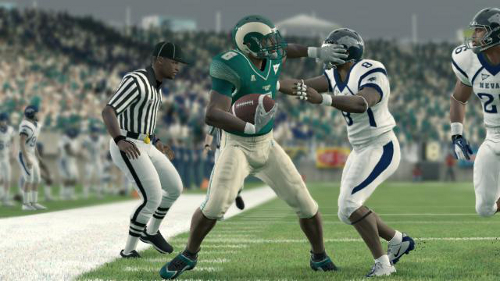Revisiting the Top Stories of 2012: Lawsuits Faced by Electronic Arts

Two high profile lawsuits against Electronic Arts carried into 2012 with one being settled and another steaming ahead towards a trial. Though the former is now filed away and ended up having very little in the way of lasting impact the other threatens the viability of any college sports video games in the future.
There were some out who held out hope that an eventual judgment in favor of the plaintiff in Pecover v. Electronic Arts would overturn the exclusive NFL license. That was never the target of the action however. The claim was that after securing the exclusive license for the NFL, NCAA, and Arena Football that all football competition was eliminated allowing EA to raise the price of their products.
Even though the merit of the case was sketchy at best the potential of what a negative judgment for EA would mean led them to settle. The result was a $27 million pool that would be split up among claimants – up to $6.89 for each PS2/Xbox/Gamecube game and $1.95 for each 360/PS3/Wii game maxing out at $69.92 total. Should there be more claimants than those numbers allow for the payouts will be reduced. The agreement also stated that EA Sports can not pursue an exclusive NCAA license for a five year period. Nothing changes with the NFL.
The settlement in the end won’t have much influence on the future of sports gaming or hurt EA all that much. Yes, $27 million is a lot of money, but to put it in proper perspective that wasn’t even half of what Madden Ultimate Team mode made in Madden NFL 12 alone and was less than the cash the NFL gave back to EA under the threat of a potential lockout year. Additionally no other company will have interest, or the resources necessary even if they did, to produce a college football game in the coming years. One big reason why relates to the other big lawsuit still making its way through the courts.
The player likeness lawsuit against the NCAA, CLC, and Electronic Arts is the culmination of two high profile filings that were combined as led by Sam Keller and Ed O’Bannon. It alleges improper use of player likeness through various forms of merchandise and media including video games in which the parties in question conspired to avoid paying players for their rights. Some interesting details and claims regarding the case at hand were revealed when EA was reentered as a defendant after initially being dismissed.
EA has won a previous case regarding player likeness with the courts ruling video games are artistic works rather than commercial speech and therefore protected by the First Amendment. The Supreme Court last year established forms of media, producing expressive works of art, are not subject to judgments based on incorporating someone’s name or likeness.
Recent uncovered emails have shown that NCAA representatives were well aware that players in games were based off real-life players. At one point the NCAA and EA had nearly reached an agreement to have actual player names included in the products. The EA Locker/Roster Share feature was a fallback option.
This consolidated case in California looks as though it will be going to trial and ultimately be the determining factor of how the NCAA proceeds in the future handling broadcasting rights, merchandising, and video games. Should a negative result come down, which one analyst has pegged as being a potential loss of $1 billion for EA, it would likely not just end the NCAA Football series but also with it any realistic possibility of college sports games being made in the future. The NCAA is currently seeking to block classification as class action. The trial now is stated to begin June 2014.
Year in Review
Much more to come throughout the month!
•#8 of 2012: NHL 13
•#9 of 2012: NCAA Football 13
•#10 of 2012: NFL Blitz
•Vote for the 2012 Community Choice Awards
•Revisiting the Top Stories of 2012: Lawsuits Faced by Electronic Arts
•Revisiting the Top Stories of 2012: Disingenuous Marketing and Unfulfilled Features
•Revisiting the Top Stories of 2012: The Disastrous Road Towards NBA Live 13
